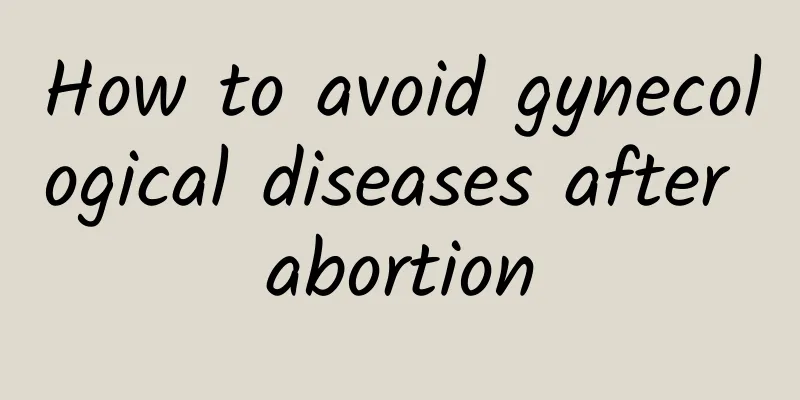How to avoid gynecological diseases after abortion

|
After an abortion, the patient will be weak and have low resistance. To avoid the occurrence of gynecological diseases after an abortion, they should avoid heavy physical labor, strictly prohibit sexual intercourse within one month after the operation, pay attention to personal hygiene and avoid sitting baths, adjust their diet to ensure adequate nutrition, etc. Avoid heavy physical labor After the abortion, the patient should rest in bed for 2 to 3 days. He or she can then get out of bed and move around, gradually increasing the activity time. Do not engage in heavy physical labor within half a month to avoid reinjury to the wound and affecting recovery. No sexual intercourse for one month Patients should strictly refrain from sexual intercourse within one month after an abortion. At this time, the damage to the endometrium has not yet fully recovered, and there may still be local damage. The ability to resist bacteria is low. Having sexual intercourse too early will allow bacteria that enter the vagina to easily infect the endometrium, leading to the occurrence of gynecological diseases such as endometritis. Keep your vulva clean After surgery, patients need to keep their vulva clean and hygienic, wash it with warm water 1-2 times a day, and change sanitary napkins and underwear frequently. Tip: If you find abdominal pain or bleeding more than menstrual volume, please go to the hospital in time. Avoid sitz baths Patients should avoid sitting baths within two weeks after abortion or before vaginal bleeding has stopped, so as to prevent unclean water from entering the vagina, causing bacteria to invade the uterus, causing infection, and leading to gynecological diseases. Diet care Pay attention to nutritional matching in diet and ensure protein intake, such as eggs, milk, fish, poultry, meat, etc. Eat more vegetables and fruits, but eat less raw, cold, and hard food to avoid irritating the intestines and causing indigestion, which is beneficial to the patient's postoperative recovery. |
<<: Polycystic ovary can cause hypothalamic amenorrhea
>>: What should patients with uterine fibroids not eat?
Recommend
Can I get pregnant if I have cervical warts?
Cervical warts are contagious and can cause serio...
Why do women have uterine fibroids? Is uterine fibroids related to sex life?
Why do women have uterine fibroids? Uterine fibro...
How to check for ectopic pregnancy
How to check for ectopic pregnancy? Ectopic pregn...
Medical research conclusions on the causes of uterine fibroids
Medically, the causes of uterine fibroids have be...
Do cervical polyps require surgery? Generally, surgical treatment
In recent years, the incidence of cervical polyps...
How long does an abortion take?
How long does an abortion take? Abortion is divid...
Is intrauterine fluid serious? Active treatment
Active treatment of intrauterine fluid has no ser...
Causes and prevention of menopause
Women's aging and menopause are inseparable, ...
What kind of surgery is usually performed for uterine fibroids? Is hysterectomy for uterine fibroids a major surgery?
What kind of surgery is usually performed for ute...
Learn more about the treatment of cervical erosion
What are the main treatments for cervical erosion...
Routine Diagnosis of Hyperprolactinemia
What are the conventional methods for diagnosing ...
How to treat bilateral adnexitis
How is bilateral adnexitis treated? Bilateral adn...
Analysis of the causes of postpartum vaginitis
At present, many women are infected with vaginiti...
Women need to know the dangers of pelvic inflammatory disease
Many women may have only a vague understanding of...
The early symptoms of uterine fibroids may only be abdominal distension.
Since the early symptoms of uterine fibroids have...









